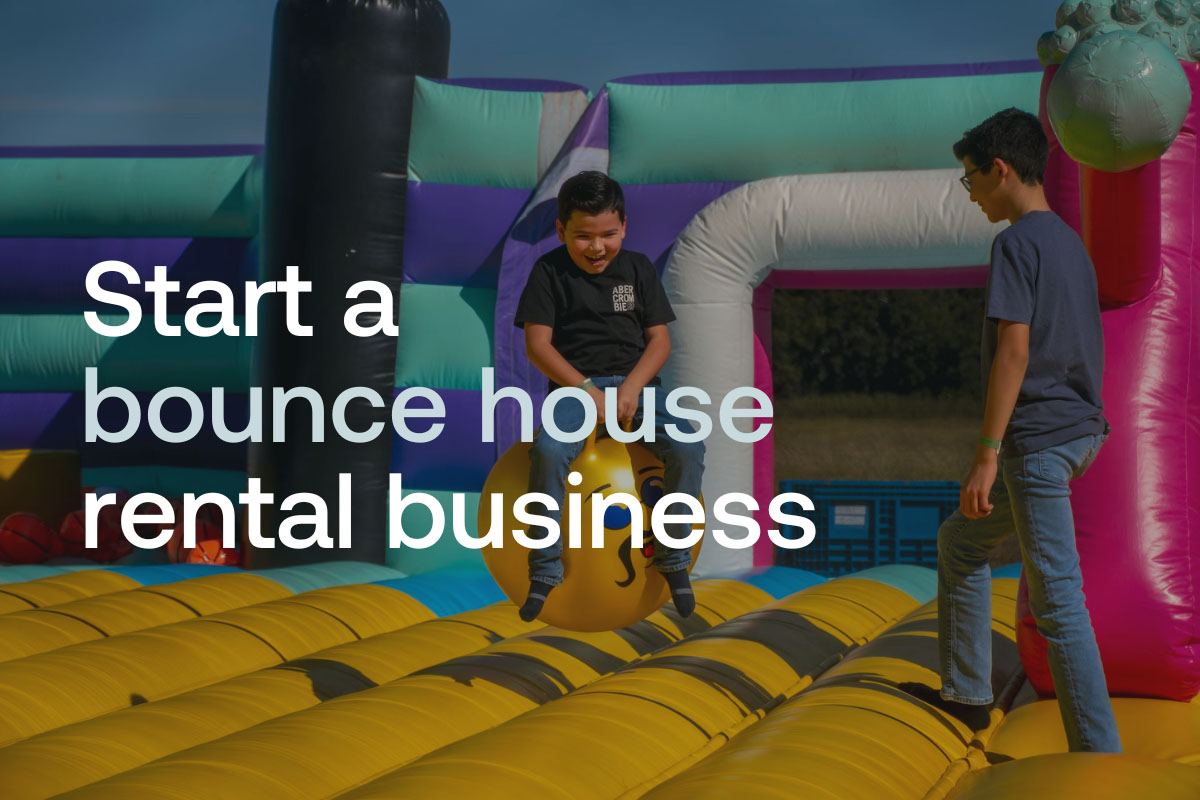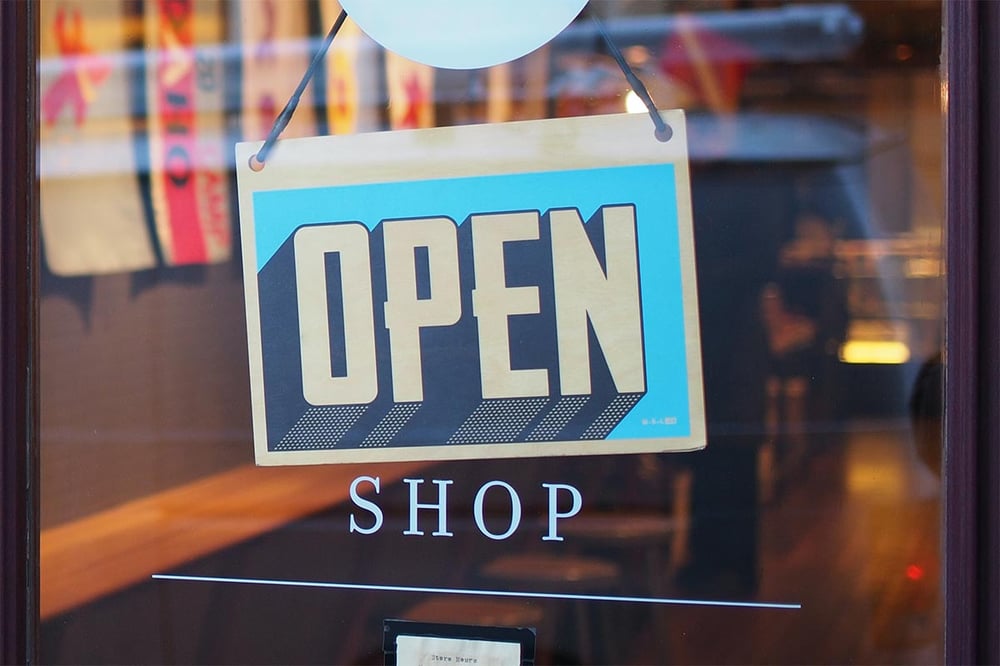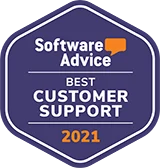If you've ever been to a kid's birthday party, you've probably been on an inflatable bounce house. But did you ever wonder who owns those things? Well, it could be you if you start an inflatable bounce house business.
You can rent bounce houses in a vast amount of places:
-
Children's birthday parties
-
Town fairs
-
School events
-
Fundraisers
-
Festivals
-
and more
Running a bounce house rental is an exciting rental business idea for new entrepreneurs. A rental company can be a great business if you're passionate about sustainability, but in some cases, the practicality of renting just makes more sense. That's precisely the case with bounce houses.
Position your operation in the right location and build a good reputation, and you can be busy all year round.
Create a bounce house rental business plan
Before you jump into your new life as a rental business owner, you need to make a business plan. You can't go into your business cold without researching your market, competitors, and the costs involved in starting a bounce house rental business.
Market research and competitor analysis
The party supply rental industry is worth $6bn a year. The sector took a slight hit during COVID-19 but is recovering well as social distancing has decreased.
Bounce house rentals are just one segment of that leisure market. From a business perspective, the great thing about bounce house rentals is that the demand is stable, and according to Google Trends, the interest in the industry has slightly increased over the last five years.
Let's look at the target market for bounce house rentals and other business-related factors you need to consider.
Who is your target market?
While kids are the biggest target market for bounce house companies, in reality, you'll be selling to their parents. However, it's worth noting that in recent years, many adults also book bounce houses for parties.
Of course, another niche that you can serve is public events. Schools, churches, fairs, festivals, and so on are all places that require bounce house rentals from time to time. But by and large, private birthday parties and similar events will likely make up the bulk of your business.
Your business location or service area can be the difference between success and failure. If your business serves an area with a high concentration of young families, you could be really busy, especially if you don't have a lot of competitors.
Who are the main competitors in your area?
One of the most important pieces of industry research you can do is find who the other bounce house businesses in your area are. If your local market is saturated with similar providers, it might be hard to make your business work.
So look at the other bounce house rental companies in your area. Find out what they are doing, their prices, what type of stock they have, and any additional information you can find.
It's essential to do this before you commit to buying any stock. You may be able to notice a gap in the market based on price, variety, service, or some other factor.
Potential areas you can expand into
Renting out bounce houses could just be the start. There are many other areas to expand in the party rental niche that you can explore to supplement your income from inflatable bounce houses. Some related businesses that could be worth exploring are things like inflatable interactive games, inflatable obstacle courses, or inflatable water slides.
Additionally, the general party rental industry is booming. Some extra things you could also offer are rental chairs and tables, tents, balloons, carnival games, face painting, etc. Basically, anything else that might help run a better party.
Budgeting and financial planning
Get your budgeting and business finances right, and the rest should fall into place. Here is a breakdown of the start-up costs, ongoing expenses, and profits you can make in the bounce house rental business.
How much does it cost to start a bounce house business?
One of the best things about starting a bounce house business is its affordability. Bounce houses cost between $1000 to $3000 depending on the type, style, and other features. Additionally, you need to invest in a generator and air blower to fill the bounce castle in places where there is no electricity.
Bounce house combos combining a traditional bounce house with an inflatable slide are more expensive and can cost between $2000 and $6000. Some of these combos include WetDry bounce houses, which could be a popular product in areas with hotter climates.
Next, you need to consider a reliable vehicle to transport your bounce house around. If you have multiple bounce houses, you might need to consider a van or truck that can fit a few houses in case your business is booming.
As a side point, if you do have a van to transport your goods around, it can be worth adding your business name or logo on the outside. For starters, using a marked van will put parents at ease and give your new business some legitimacy. Secondly, add your phone number, email, or social media, and it can double up as free advertising.
Other costs depend on how you set up your business. Some bounce house businesses operate out of a shop or other premises. However, it's not the sort of business that will necessarily benefit from foot traffic, so if you want to save money, you can easily operate from your home, provided you have a bit of space to work with.
What are the ongoing expenses for a bounce house business?
When you're budgeting for a bounce house business, there are several outgoing expenses that you'll need to consider. Some of these are related to equipment maintenance, staff, or general costs for running your business.
Here is a quick rundown of the ongoing expenses you need to consider.
Equipment maintenance
-
Cleaning supplies
-
Equipment repair
Insurance
-
Business Insurance
-
General liability insurance
Operational costs
-
Gas
-
Energy
-
Labor
-
Vehicle repair and maintenance
Marketing
-
Paid ads
-
Social media marketing
Some of these expenses are unavoidable, while others are something you can choose to add to your business.
How much can you charge your customers?
The rental period for bounce houses is usually in two hours blocks, like 2, 4, 6, 8, and 10 hours. However, the price depends on the region you operate in, the types of services you supply, and the product itself.
Standard rates are roughly $30 to $50 per hour. However, this can be higher based on the size and features of each bounce house.
How much profit can a bounce house business make?
The average inflatable bounce house business will rent each house approximately 1.5X per week. If that's $50 per hour for four hours, that's $200 per party. If you buy a bounce house for $2000, it will take ten rentals (or about seven weeks) to pay it off. After that, it's pure profit minus your expenses.
So, if we work it out like that, you could say each bounce house generates around $300 per week. If you buy a commercial bounce house, it should last around five years.
Adding a second bounce house to your stable could mean revenues of around $2,400 per month once you've covered your initial outlay. Obviously, this can scale up as you add more bounce houses.
Establish a legal entity for your business
If you want to run any business, you need to take care of the administrative side of things. There are things like business registration and taxes to think about for a bounce house business. And because you'll be dealing with people, you also need business insurance if anything goes wrong.
Choose a name for your business
One of the first steps (or bounces) on your entrepreneurial journey is coming up with a business name. However, finding a moniker that captures your business's joyous spirit can be tricky.
It's pretty standard for a bounce house business to have "bounce houses" or "party" in their name. There are a few good reasons for this. Firstly, it makes it very clear to potential customers what your business is about. Secondly, if you have a website or social media account, it helps with search engine optimization.
However, if you do go down this route, there are a few things you need to know. Firstly, it can be hard to stand out from your competitors if your business name is too similar. Secondly, when customers search for your business, they'll also find your competitors. It's a difficult balance to strike.
Once you've found the right business name, you should check your state's business records, website names, social media handles, and trademarks. You must ensure you are operating with a unique name to avoid confusion.
Form a business entity
Next up, you must consider which legal structure is best for your business. You shouldn't take this choice lightly because it can affect your liability, taxes, and more.
Here is a quick rundown of your options.
Sole proprietorship: This is the most common structure for small businesses. Effectively, it means that you are the business, and there is no distinction between the business and its owner. This setup means you are liable for any debts, liabilities, and losses. Additionally, you pay taxes on your business income or your personal tax return.
General partnership: This structure is similar to a sole proprietorship. However, it's used when there are two or more business owners. Be careful when you select a business partner because you'll be liable and responsible for any decisions they make.
LLC: An LLC, or limited liability company, shields the owners from debts. In the eyes of the law, the business and the business owner are separate entities. With an LLC structure, you also get passed through taxes. That means you pay personal income tax for your share of the business.
C Corp: A C corp also distinguishes between the business owner and the rental company. As such, you're not liable for debts. However, the downside is that both the owner AND the business pay taxes.
Overall, an LLC is probably your best choice here. They are easy to form, limit your liability for losses, and, unlike a C Corp, you can pass through your taxes.
Register for taxes
Regarding taxes, if you run a rental business, you must register for taxes before you can operate. Remember, you'll need to pay both state and federal taxes. Additionally, most companies must collect sales tax on the products and services they sell.
To do that, you'll need to get an EIN or Employee Identification Number. The IRS issues these numbers. It's free and easy to do online.
If you decide to structure your business as a sole proprietorship, you can just use your social security number (SSN) in place of an EIN.
Some of the taxes you need to pay to depend on your business structure. If you set up an LLC, you can consider using the IRS designation called S corporation. Essentially, it allows you to pass through your taxes as an LLC or corporation. This setup means you aren't double-taxed.
For more information, consult the IRS website.
Set up a business bank account
Next up, you'll need a business bank account to store all that money you'll be making! On a serious note, this stage is critical. Commingling funds — i.e., mixing your personal and business money — is a terrible idea.
For starters, it can cause you to lose liability protection if you're an LLC. If that happens, your personal assets are at risk if you get sued or lose money.
Secondly, it makes calculating your taxes, business forecasting, analysis, and accounting far more complex.
Opening a business account has other benefits too. It allows you to start building credit, access business loans, and get a company credit card, which can help with cash flow.
Necessary permits and licenses for bounce house businesses
When starting an inflatable bounce house business, you must apply for all the necessary permits and licenses. Failure to do so could lead to fines or the termination of your business.
You'll need to get several licenses from agencies at the federal, state, and local levels. However, there is a lot of variation from state to state.
State licensing
Some states don't require a license but have other regulations in place. Some of these regulations involve annual equipment inspections and proof of insurance. Additionally, other states require that you pass a criminal background check.
You must check your state's rules. For example, Virginia requires permits for "inflatable amusement devices."
Local licensing
Local licensing is typically more geared towards bouncing houses placed on public property, i.e., fairs, city parks, etc. If that's an area you want to get involved in, you need to ensure you are compliant.
Permits & general business licenses
You may also need a more general business license, depending on your state. In short, ensure you check the requirements in your state and local area before proceeding.
Buy business insurance suitable for bounce house businesses
If you run a bounce house business, you need to get business insurance and liability insurance. In fact, without insurance, you won't be running your business lawfully.
General liability insurance: General liability insurance is an excellent catch-all policy. It protects your business from covered losses, including bodily harm and damage to property.
Business property insurance: This type of insurance insures your equipment from damage.
Auto insurance: Protects your vehicle if an accident or breakdown occurs.
Worker's compensation: Protects your employees from injury on the job.
So decide what coverage you need and call around until you find the right insurance company and policy.
Other policies you should think of
Insurance policies aren't the only policies you need to consider. If you have an inflatable bounce house business, there are a few policies you can implement to ensure the smooth running of your business and protection from a range of financial losses.
Liability waiver
Having a liability waiver that your customers sign when they use your bounce house rentals is a really good idea. Kids jumping around high on sugar at a party is chaotic. Anything can happen, including falls or collisions. Even when you have the best safety precautions available, it's just the nature of the activity.
You need to protect yourself from any claims that people could make against your business. Of course, you must also uphold the highest safety standards on your end to avoid any reputational damage, for example.
Safety policy
A safety policy is another essential element of any inflatable bounce house business. So draw up some rules that will ensure a safe and fun experience. Things to include are:
-
A limit to the number of people on the bounce house at one time
-
No shoes
-
No sharp objects, glasses, etc.
-
Keep taller and smaller users separate, etc.
Cancellation policy
Imagine this scenario. You have two bounce houses; both are booked out for the coming weekend. You get an inquiry, but you have to turn them down. Then, on the day of delivery, one of your customers cancels. You've lost business.
It's worth working a cancellation policy into your agreement. It can be a percentage of the total rental fee, or you can only do something like 24 or 48 hours notice.
With Twice, it's easy to create and display a cancellation policy. You can also use the automatic deposit feature, which makes a pre-authorization of your customer's card, from which you can charge the fee according to your cancellation policy.
Get the right equipment for your bounce house business
When starting a bounce house business, you might be tempted to buy a residential rather than commercial use bounce house. However, that would be a big mistake.
If you rent inflatable bounce houses, your equipment will likely encounter a lot of wear and tear. Residential bounce houses aren't built to withstand heavy use over a prolonged period. Buying a residential bounce house could be a false economy. Sure, you'll save a few pounds on initial costs, but you'll lose that (and more) if you have to replace it regularly.
Also, make sure you get a generator and an air blower that are powerful enough for the bouncy castles you rent.
Plan your daily operations
If you want a smooth-running inflatable bounce house business, you need to plan how it will operate daily.
Storage
Depending on how big your bounce house business is, you'll need to ensure you have enough space to store your inventory. A deflated bounce house will compress down to a small size, but you'll also need to find space for other items, like a blower, generator, cleaning materials, hand truck, and any other times you use for your operation.
If you have garage space, that will be enough room for a smaller operation. However, if your business grows and you accumulate more bounce houses, you may need to explore other options, such as a lockup or rented storage space.
While most bounce houses come with durable storage bags for transporting around, you shouldn't keep them outside. You'll want to keep your products in the best shape possible so they always look good and last a long time.
Inventory management
Inventory management is a crucial part of any rental business. If your inflatable bounce house business is just starting out, it probably won't be hard to keep track of your bookings. However, it's good practice to have an inventory management system.
A good inventory management system, like Twice, can help you keep track of the history of your items, where they are, and whether they are in stock. You can also integrate this information with your website, allowing your website visitors to see availabilities at all times.
We have written a more in-depth article about rental inventory management so check it out if you want to dig deeper.
Order fulfillment and scheduling
Order fulfillment and scheduling are something you need to get right if you're running any kind of party rental business. While you can operate using phone calls and a diary, consumer expectations have been transformed in recent years.
The modern consumer doesn't want to make phone calls or send emails. They're more interested in self-serve options. They expect to be able to go online, browse products, and see the available dates. Additionally, your rental prices should be clear and transparent on your website.
Now, of course, not every inflatable bounce house business is going to have a dedicated website. It takes time and expertise and requires maintenance. One popular alternative is to use a rental platform or a social media account.
Twice helps businesses rent their products using our platform. You can build a web presence in minutes and connect your inventory management and scheduling systems to the site. Another benefit of using Twice is that it gives you access to a secure payment gateway where you can process credit cards, Google and Apple Pay, and other local payment options.
Delivery
If you want to rent bounce houses in your area, you need a reliable vehicle to transport your goods from place to place. When you get a rental booking, you'll need to account for the following:
-
The time the bounce house is booked for (i.e., 4 hours)
-
Build up and build down times (approx 30mins each)
-
Driving to and from the location
Keep all these factors in mind when you are scheduling your appointments.
Build-up
As mentioned above, a significant factor in your operation is the build-up of your bounce house. Once you get the hang of it, you can probably set up a bounce house in around 20 mins.
There are a few steps that you need to follow when you are setting up a bounce house.
1. Preparation
The most important element of any bounce house rental is safety. So check the weather forecast for strong winds, heavy rain, or other poor weather conditions. If conditions are too extreme, someone could get a severe injury from slipping or falling.
Next, check out the location. An inflatable bounce is best set up on a smooth, flat surface with a few meters of space to either side. Low trees, nearby pools, powerlines, or sharp inclines are all hazards you must avoid.
So, survey the weather and the location before you set up your bounce house.
2. Lay out the bounce house
Place your tarp (optional) on the area and layout your bounce house. Ensure there is good access to the entrance and space on either side.
3. Hook up the blower
Most bounce houses come with a blower to inflate the product. Hook it up to the mains via an extension cord or connect it to your generator.
Connect the blower to the bounce house inlets and tie up any outlets.
4. Inflate the bounce house
Aside from all the jumping around, this is the fun part. Inflate the bounce house and carefully look out for any leaks or rips. If you notice any, stop the blower and repair the bounce house.
5. Tie it down
Anchoring your bounce house is an essential step. If your bounce house gets taken by the wind or tips over, it'll ruin the birthday party. So ensure everything is secured tightly.
Then it's time for a quick inspection of the house material and the anchors, and you're ready to go.
Build down
No party can last forever. When you come to collect your inflatable bounce house, there are a few steps that you need to take to ensure the longevity of your product.
1. Inspection
Once everyone is off the bounce house, it's time for a quick inspection. Any rental company should ensure their equipment has been appropriately treated so that you can deal with issues immediately. Some wear and tear are unavoidable. Either way, if you notice any tears, note them down for repair.
2. Clean down
Even if you have a no-shoes and no-drinks policy, your bounce house will need cleaning after even moderate use. So wipe down the bounce house and then dry it off. This step is essential if you want to avoid mildew and mold.
3. Turn off the blower
Turn off the blower and unplug the inlets. Give the blower a wipe too.
4. Open the outlets
Open the outlets and let out the air.
5. Remove the anchors and deflate
Next up, you need to remove the anchors and pack them away. Let the house deflate completely.
6. Fold and pack
Then fold up the bounce house and pack it away.
Equipment maintenance
Most of the maintenance work you need to perform for your inflatable bounce houses can be taken care of at the build-up and build-down stages. Once you follow the guidelines above and appropriately store your bounce house, you shouldn't have many issues.
A tear in a bounce house is reasonably straightforward to mend. A vinyl patch is the best way to repair rips for commercial bounce houses.
Otherwise, you need to ensure your blower is functioning at all times. It's a vital piece of kit, so ensure you always have a spare in case of any problems.
Start building your brand
Build a website
You need a business website, or at minimum, a strong social media presence, if you want to run a bounce house business. There are several great website builder options for rental businesses. If you're not a developer and are not planning to become one, Squarespace is a great option.
If you build a website, search engines can provide a steady source of business for your inflatable rental business. As bounce house businesses are local by nature, local search engine optimization (SEO) is vital. So target local searches by including keywords and the areas in which you want to operate. For example, "bounce house rental in <insert location>".
Remember to check out our guide on how to build a rental website step by step.
Market your business to acquire customers and build a reputation
Digital marketing is everything these days. Many potential customers will use social media accounts to find and contact businesses. You need a presence on Facebook, Instagram, etc. Social media marketing can be an excellent way to connect with parents in your area.
Additionally, locally-focused message boards and even more traditional places like local magazines or community message boards can get results.
If you know people in your local community, you can use your network to spread awareness about your business.
Otherwise, Facebook or Google Ads are a great way to jump-start your business. While running paid ads can be expensive, using the right keywords and audience targeting can produce a good return on investment (ROI).
Experimentation is the key here. So run a few ads and see if they get results. Facebook and Google Ads require a bit of trial and error, but they can be very effective once you get them right.
Here are a few more ideas on how to advertise your rental business.
Conclusion
Running a bounce house business can be a great idea. The industry is growing, and it's a business that you can get up and going with a relatively small investment. So, if you want to be your own boss and ride around bringing fun and sunshine into people's lives, then an inflatable bounce house business could be perfect for you.
Party rentals can be a great business idea in the right location. An inflatable bounce house business can generate a steady income with relatively small investments. Additionally, you can expand your service by offering inflatable obstacle courses or water slides.
Running your own business has lots of ups and downs. However, not many businesses bring fun to the community, quite like an inflatable bounce house business.









